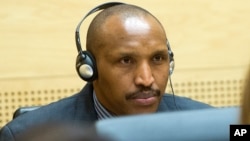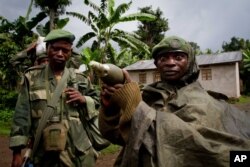AMSTERDAM —
Prosecutors have presented enough evidence to justify putting on trial a Congolese militia leader accused of rape, murder and enlisting child soldiers, judges at the International Criminal Court said on Monday.
Bosco Ntaganda, widely known as “the Terminator,” surrendered to the U.S. embassy in the Rwandan capital Kigali in March and was transferred to the ICC in The Hague.
Judges said in a statement there was sufficient evidence of his involvement to proceed to a trial. He will face 18 counts of war crimes and crimes against humanity for his alleged involvement in a surge of ethnic violence in the Democratic Republic of Congo more than a decade ago.
Prosecutors will now seek to prove the charges against Ntaganda, who commanded the United of Congolese Patriots (UPC) militia, in a trial.
“There was a widespread and systematic attack against the civilian population,” the judges said in a statement. The UPC militia targeted “civilians perceived to be non-Hema, such as those belonging to Lendu, Bira and Nande ethnic groups”.
Success for court
The decision marked a rare success for prosecutors, who have struggled to build solid cases at the court, established more than a decade ago to prosecute individuals responsible for war crimes.
The New York-based Human Rights Watch said Monday's decision would open the way for broader justice in wartorn east of the Democratic Republic of Congo.
“The ICC decision sending Ntaganda to trial opens the door to justice for victims of horrific crimes in Ituri,” said Geraldine Mattioli-Zeltner, international justice advocacy director at Human Rights Watch.
“Ntaganda's upcoming trial will send a powerful message to those responsible for grave crimes in Congo that justice will eventually catch up with them.”
Bosco Ntaganda, widely known as “the Terminator,” surrendered to the U.S. embassy in the Rwandan capital Kigali in March and was transferred to the ICC in The Hague.
Judges said in a statement there was sufficient evidence of his involvement to proceed to a trial. He will face 18 counts of war crimes and crimes against humanity for his alleged involvement in a surge of ethnic violence in the Democratic Republic of Congo more than a decade ago.
Prosecutors will now seek to prove the charges against Ntaganda, who commanded the United of Congolese Patriots (UPC) militia, in a trial.
“There was a widespread and systematic attack against the civilian population,” the judges said in a statement. The UPC militia targeted “civilians perceived to be non-Hema, such as those belonging to Lendu, Bira and Nande ethnic groups”.
Success for court
The decision marked a rare success for prosecutors, who have struggled to build solid cases at the court, established more than a decade ago to prosecute individuals responsible for war crimes.
The New York-based Human Rights Watch said Monday's decision would open the way for broader justice in wartorn east of the Democratic Republic of Congo.
“The ICC decision sending Ntaganda to trial opens the door to justice for victims of horrific crimes in Ituri,” said Geraldine Mattioli-Zeltner, international justice advocacy director at Human Rights Watch.
“Ntaganda's upcoming trial will send a powerful message to those responsible for grave crimes in Congo that justice will eventually catch up with them.”






